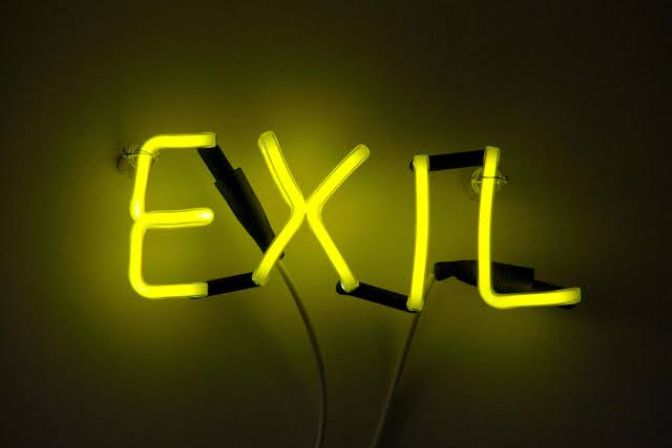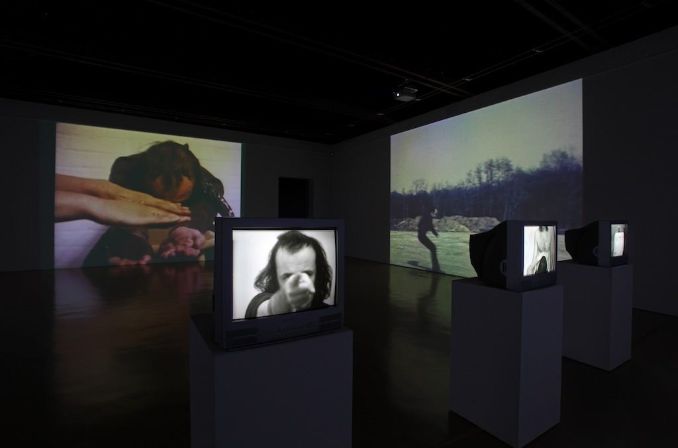Counterpoints was a compelling two-person exhibition featuring the works of contemporary Chinese artists Lu Chunsheng (b. 1968, Changchun, Jilin Province) and Jia Aili (b. 1979, Liaoning Province), held at the Institute of International Visual Arts (Iniva), London. The exhibition interrogated the complex realities of China’s rapid industrialisation and its sociocultural reverberations, exploring themes of mechanisation, alienation, and the fragmentation of identity in the post-industrial age.
Lu Chunsheng’s latest single-channel video work, The first man who bought a juicer bought it not for drinking juice, a haunting and enigmatic cinematic piece that sits at the intersection of documentary realism and allegorical fantasy. The title itself is a cryptic aphorism, suggesting a detachment between intention and action—a metaphor for the absurd and sometimes paradoxical nature of modern life shaped by consumerism and industrial automation.
The video portrays a dystopian landscape inhabited by hybrid figures—half human, half machine—engaged in repetitive, ritualistic acts. These characters move in slow, mechanical motions, encapsulating a cyclical, almost hypnotic loop that evokes a sense of alienation and futility. This repetitive choreography gestures toward the loss of agency under global capitalism, where individuals are reduced to cogs within vast socio-economic machinery. Through this poetic visual language, Lu explores how the mechanisation of life erodes individuality, whilst also reflecting on the emotional and psychological impact of China’s breakneck industrial development.
Watch >> Installation
Watch >> Interview
Lu Chunsheng’s background in sculpture from the China National Academy of Fine Arts profoundly informs his work’s material and spatial concerns. His art traverses media—from sculpture and installation to experimental film—yet consistently revolves around themes of mechanisation, the body, and social decay. His films operate as dark, surreal narratives that resist conventional storytelling, instead layering imagery and sound to create immersive environments for reflection and unease. His work can be understood as a critical response to China’s post-Mao transition, capturing the tension between tradition and hyper-modernity, humanity and machine, control and chaos. The hybrid figures in his videos symbolize the fractured subjectivities emerging from a society in flux, negotiating identity amidst rapid technological and cultural change.
Lu Chunsheng’s work has garnered international attention through participation in some of the world’s most prestigious exhibitions and institutions, including: 27th Bienal de Sao Paulo (2006); China Power Station: Part I, Battersea Power Station, (London, UK, 2006); China Contemporary Art, Architecture and Visual Culture, Museum Boijmans van Beuningen (Rotterdam, 2006); The Thirteen: Chinese Video Now, P.S.1 Contemporary Art Center (New York, 2006); Out of Sight, De Appel Foundation (Amsterdam, 2005); Double Vision, 1st Lianzhou International Foto Festival (2005); and Zooming Into Focus: Chinese Contemporary Photography and Video from Haudenschild Collection, National Art Museum (Beijing, 2005); and subsequently in Mexico City and Shanghai.
The first man who bought a juicer bought it not for drinking juice was developed during a residency at Artpace San Antonio, Texas, a programme organised by renowned curator Hans Ulrich Obrist, fostering cross-cultural artistic exchange. The project is exhibited in London by Keith Whittle in partnership with David Thorpe and Iniva London. It was commissioned by Artpace and supported by ShanghART Gallery, one of China’s leading contemporary art galleries.
Following its London premiere at Iniva, the work toured to Newcastle through a collaboration with CIRCA Contemporary Art Projects, featured in the international moving image programme Everybody Knows This Is Nowhere, which highlights global contemporary artists engaging with urgent socio-political themes.
An accompanying catalogue features newly commissioned essays by David Thorp and Keith Whittle, alongside full-colour installation views and artist documentation. Counterpoints was produced with support from Arts Council England and marked an important moment in the cross-cultural dialogue between China and the UK’s contemporary art scenes. The exhibition extended Iniva’s legacy of showcasing underrepresented voices in contemporary practice and fostering critical international perspectives.











